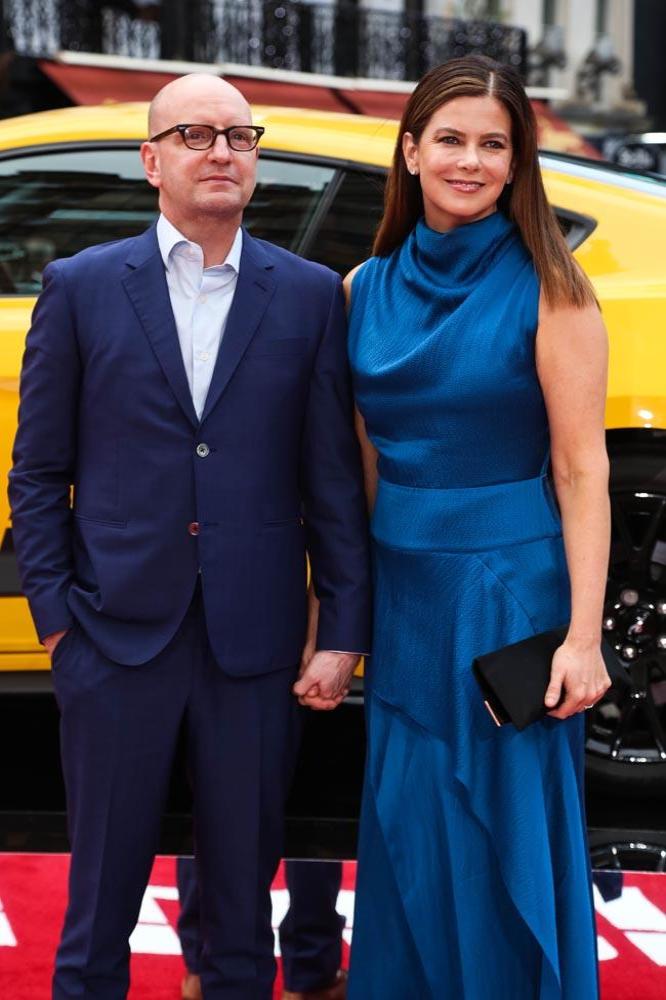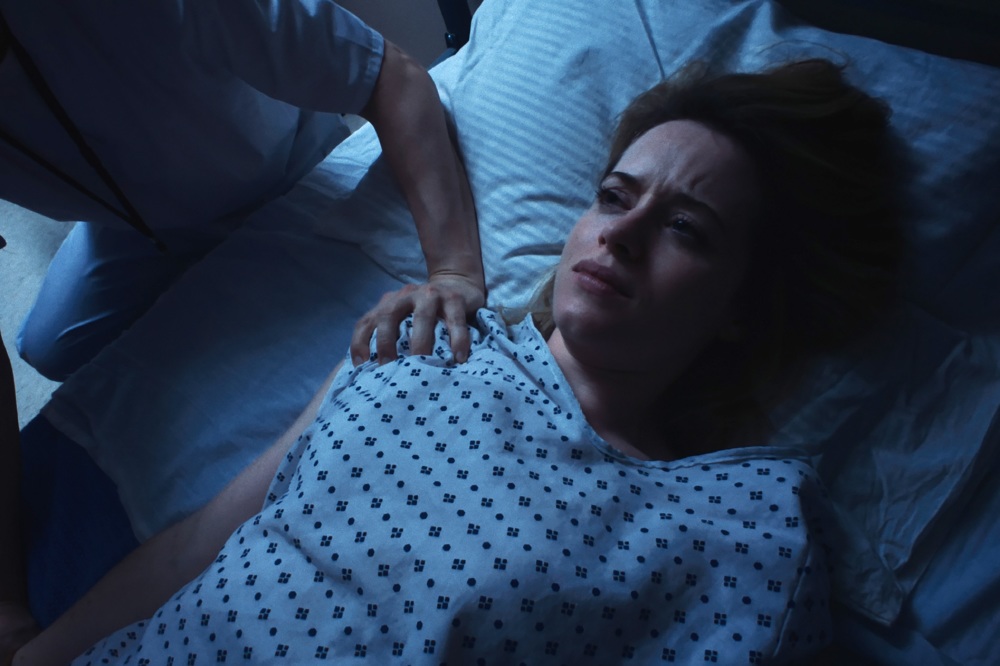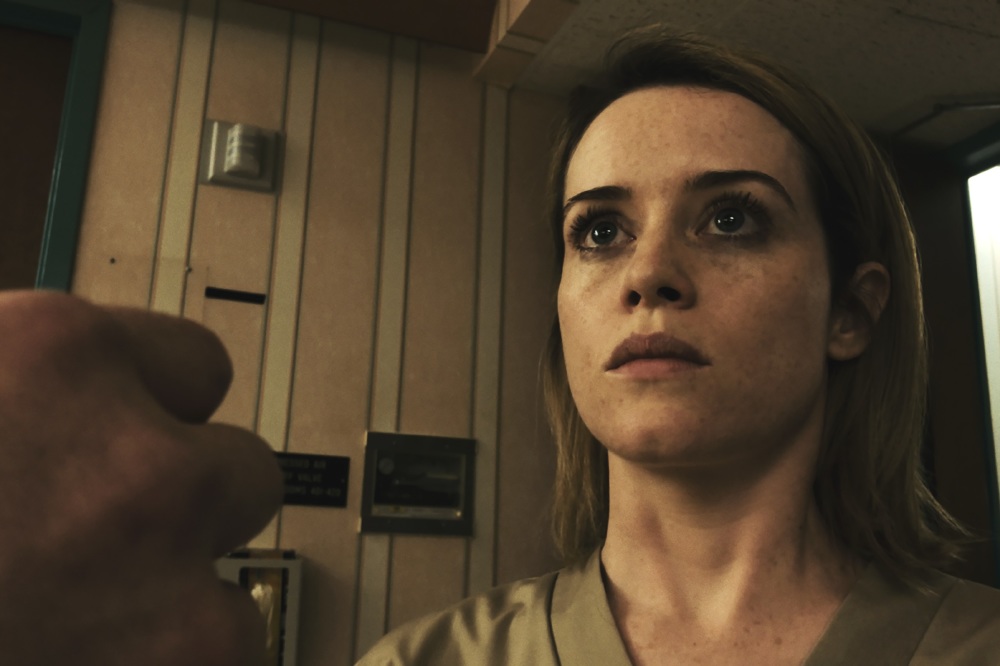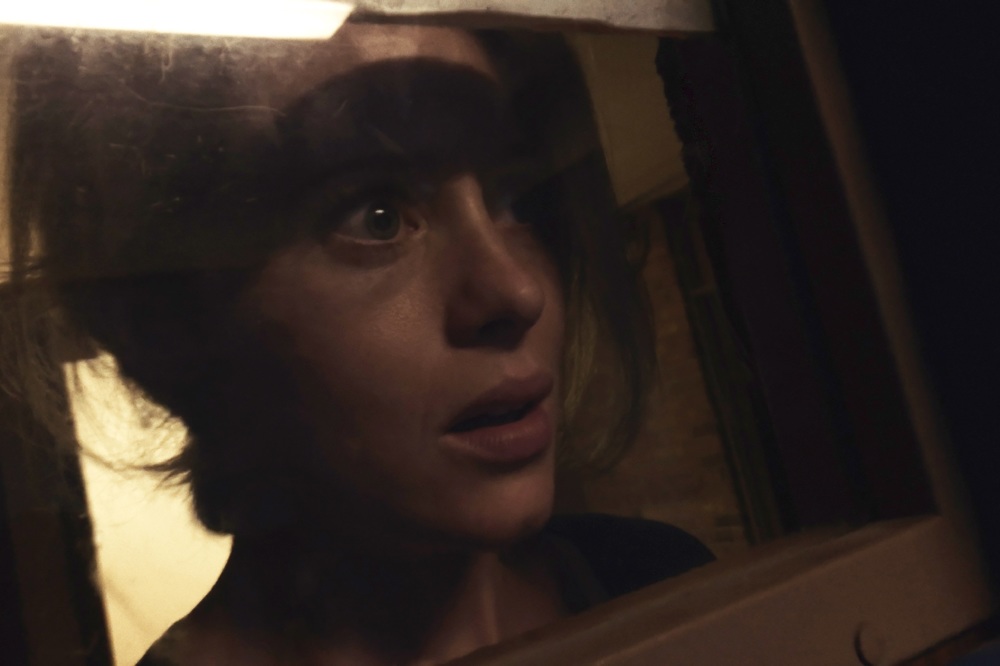Steven Soderbergh continues to be at the forefront of visual storytelling, nearly three decades since winning the Palme d’Or with his debut film sex, lies, and videotape (1989). From feature films to traditional television and experimental hybrids – such as interactive series Mosaic – he’s a man who has since that point been prepared to try pretty much anything.

Steven Soderbergh with wife Jules Asner
Following on the heels of his 2017 heist caper Logan Lucky, his latest film Unsane couldn’t be more different: an intimate, immersive and deeply unsettling story of a young professional who is drawn into a living nightmare after she seeks medical help in a new city.
British actress Claire Foy – who has won a Golden Globe and two SAG Awards for her performance as Queen Elizabeth in Netflix original series The Crown – plays Sawyer Valentini; a woman tormented by her past and, possibly, her own mind.
The film took advantage of advances in technology and Soderbergh’s own evolving working processes to come together remarkably quickly, with Foy supported by an eclectic, electric cast including Saturday Night Live’s Jay Pharoah and Amy Irving; the latter of whom has previously worked with Soderbergh on Traffic, for which he won the Best Director Oscar.
We spoke with the director a couple of weeks before Unsane’s premiere in Berlin – and only a few days after he had added some extra shots to the apparently finished film.
“I watched it again over the weekend and saw one thing I wanted to adjust,” he said. “So we did a little bit of shooting on Monday and stuck that stuff in on Monday night. That’s the beauty of this new technology!”
You’ve talked before about the benefits of the advances in technology, and how if you’d had them earlier it would have changed your career, but would you have had the confidence to do those things if you hadn’t had the grounding in slower, more traditional techniques?
I don’t think so. I mean, look, it’s a proposition that requires a time machine. I think of it in a different context: being an aspiring filmmaker now, with access to absolutely everything all the time, you would think that just on a pure craft level there would be a much higher bar than I think there is. When I was growing up you had to wait for these movies to show up somewhere: at a repertory house or a second or third run. And in the meantime, while you were waiting, you would read about them. And talk about them with your friends. And there was a kind of an intellectual margination that would go on because you didn’t have access to anything you wanted to see all the time. So I’m kind of stunned when I see films made by people just coming up where I feel like there’s been no benefit, apparently, to being able to see whatever you want. That surprises me.
It seems like that should be part of the job?
Yeah, I think so if you’re gonna really have a deep understanding of the art form. Imagine what it must have been like for a movie audience to see something like Intolerance for the first time. Or to see Hiroshima Mon Amour for the first time. God, you know, their heads must have exploded. Here were two people showing them something that had never been seen before. Something radical. What must that have been like? That’s part of the fun of it.
Is part of what motivates you that desire to do something new, something different?
Unsane is a kind of film that I was trying to make for years, or at least trying to find a piece of material like it. And it happened to sync up with a moment in time where I’d done enough testing with this new technology to feel like, ‘I’m ready to make a movie using this and this is the perfect movie to do it with’. And my continual attempt, in terms of both process and shooting style, to distil everything down to its absolute essence – that there’s just nothing wasted and every shot, every cut, has a purpose and if there was one more cut more it would feel excessive and if there was one cut less it would feel diminished. I’m just constantly trying to analyse: how can I make this thing just all muscle-mass?
Do you storyboard or is it more worked out in the moment?
Storyboarding’s never been something I’ve been able to utilize. I think it’s partially a lack of pure imagination. I’ll do a lot of homework in terms of watching things that I think are relevant or could be helpful to what I’m about to do. I’ll start to work on the basic grammar visually that the film’s going to employ, in terms of lenses and movement and trying to come up with a set of rules that I’m going to adhere to. But I’m either hesitant or unable to nail down any specific images until I’m on set and I have the cast and I can see what the action is. I guess it’s because there’s just so many times when we show up and, through the process of rehearsing and blocking, things change significantly. And as opposed to burning a lot of calories detailing something that could very well be thrown away, I’d rather just invent it on the spot.

So when you’re meeting with the cast or Heads of Department before you shoot, is it a case of making sure everyone understands what the goal is, rather than the minutiae?
Yeah. You know, we’ll have conversations about how the set runs. And what my process is. And any meetings that I have typically with the cast beforehand are more about me trying to get a sense of them personally, so that I know how to talk to them. They’ll be some swapping of war stories. I’ll ask them to describe the good experiences they’ve had. I’ll ask them to, anonymously, describe the bad experiences they’ve had. I just wanna get a sense of how to engage with them. And explain to them, ‘Look, it’s gonna go fast, but you’re not gonna be rushed. I’m not rushing you. I’m just not someone who believes you should make things harder than they need to be. And if things are going well, it’s gonna move at a pretty good clip’. But I’ve never – well not to my face – had anybody complain that they felt rushed.
The produced credits of Unsane screenwriters Jonathan Bernstein and James Greer don’t suggest it’s the sort of film that’s in their wheelhouse – how did it come about?
Jim Greer I’ve known for a long time. I got to know him initially because of my worship of Guided By Voices. Jim was in the band for a while and has a connection with Robert Pollard. I wrote an introduction to a book that Jim wrote about Guided By Voices. And around that time I was working on two projects. I had this John Barth novel, The Sot-Weed Factor. And then I had this idea to do a Cleopatra musical in which I would repurpose a group of Robert Pollard songs and have the lyrics adjusted to fit the story of Cleopatra. The idea was that this would be a musical in the style of, say, Tommy. Ultimately neither project ended up moving forward (Jim and I are still continuing to work on The Sot-Weed Factor, it’s just a tricky project). So all that is to say in mid-January 2017, he called me up and he said, ‘Do you have anything that I can work on? I need a gig’. I said, ‘No, I don’t, but if you write a low-budget horror thriller, I’ll shoot it June 1st’. And he said ‘Okay’ and hung up the phone and three weeks later the script showed up.
That’s remarkable.
Yeah. I was stunned. Because I read it and I said, ‘We’re gonna start June 1st’. And I called my casting director [Carmen Cuba] and we started having conversations about the lead and we both kind of came to the Claire Foy intersection. And I said, ‘I’ll fly to London for six hours to meet with her to see if she’ll be interested’. So I jumped on a plane and she and I talked for two or three hours. And she said, ‘I’d love to do it’. Once that happened we were good to go.
She has an amazing ability to convey internal conflict – did you know her from The Crown?
I’d seen that and I’d seen Wolf Hall. But one of the things I loved about the idea of her doing this is it seemed like a great opportunity to sort of annihilate all of her work on The Crown. When I watch the movie, I forget it’s Claire. She’s so different in this, in every particular, that I literally at times forget. ‘Oh shit! That’s Claire Foy’. Who we know as Queen Elizabeth.
How much work do you do with the actors and writers to convey back story and stuff that’s not on the screen?
It depends. In this case there were a couple of conversations just about the degree to which we wanted to play the idea of her being delusional. How far into the movie can we push this idea that she may really have a problem and could be overreacting to something that happened in her past? That was the only conversation I recall having with Claire and with the writers.
How important do you think it is for everyone to have the kind of same interpretation?
I think now this becomes a discussion about the difference between ambiguity and confusion. You know, ambiguity means one of two things are possible. Confusion is, ‘I have no idea what’s going on’. And here I always felt that we were in a true ambiguous space, which is: ‘Is she or isn’t she delusional?’
Unsane deals with a threat to a woman and feels particularly timely – well, it’s sadly forever timely. Did that play into the decision to do this?
This came entirely from Jonathan and James. I don’t know whether or not they had a discussion about the gender power dynamics that exist nowadays and the fact that technology increases those inequities, when somebody predatory uses the technology to their own end. And the kind of social commentary underneath it all about how the healthcare system works. I don’t know if they sat around saying we should do something that isn’t entirely disposable, that has some sort of quiet resonance so that when people leave the theatre it just doesn’t disappear from their minds. I don’t know if they discussed that or not. I was certainly happy that the movie had these other things going on that were kind of leaking in from the corners.
It could have been easy to receive the script and go, ‘It’s well done but it doesn’t feel vital’…
Yeah. Or it doesn’t feel connected to anything real. It’s just a movie made out of the parts of other movies. That would have been unsatisfying for me. But I liked that they hooked into something that felt current and was also not gonna go away anytime soon.
The film deals to a degree with healthcare and mental health, which is something you touched on in your 2013 film Side Effects. Is that of particular interest or is that just coincidence?
I think it’s just coincidence, although it is something that I’m interested in generally just because it affects everyone. It affects our families and our friends and, at least in the United States, there doesn’t seem to be any daylight going forward in terms of a solution. We had something in place that was imperfect but was better than nothing. And now that’s partially dismantled. It’s still unclear exactly what aspects of the healthcare system that was created are still relevant and in operation and which ones aren’t. It’s very confusing, which for people whose lives depend on this is terrifying.
Was your intent going into Unsane to make a horror film? It could also be called a psychological thriller…
When people ask me I say, ‘Well if you’re a woman, it’s a horror film. If you’re a guy it’s a primer on how to meet your soul mate.’ But yeah, I think it depends. I think the term horror conjures a certain kind of film for some people. I wanted to be careful that I wasn’t creating an expectation that was inaccurate. So I view it more as a psychological thriller, but I also know from talking to the women who’ve seen the film that their response to it is extremely visceral. And they view it as a waking nightmare.

On your site – extension765.com – you post a list of what you watch and read each year. Before making Unsane it included Prevenge, Repulsion, The Shining. And you watched The Eyes of Laura Mars just after the first couple of cuts – can you remember what you were looking for specifically in those films?
Well I can tell you what I took from Eyes of Laura Mars: I stole their font. The film is a fascinating ‘70s artifact. Notable mostly because it has John Carpenter as one of the screenwriters. And the other stuff: I’m looking for things that work and I’m looking for things that I should avoid. I’m taking a magpie approach and just trying to steal the stuff that I think is valuable.
Prevenge maintains a real momentum despite not having any right to do so, in terms of budget…
Yeah. That’s the other thing I love about this particular genre: a lack of resources doesn’t matter at all. In fact, most of the sort of seminal horror/thriller/whatever titles were made independently for not a lot of money. It’s not a genre that really benefits from having… not only too much money but maybe even enough money. It rewards a certain kind of lateral thinking. Blair Witch is the perfect example of that. I think that’s a movie in which the conceit is so strong that it really didn’t matter if they had 10 more dollars to produce the movie.
You had an aggressive shooting schedule for Unsane. Was that always your intent?
I thought it was doable based on the trajectory I’ve been on since the first season of The Knick. I felt my filtering process was improving. Combined with the fact that now I was dealing with technology in which I could place the lens anywhere I wanted in a matter of seconds and start shooting.
You used an iPhone – with lenses and a rig – to capture the film and shot using natural light. Was that an adjustment for the cast?
You’d have to ask them if it was weird to look in front of them and see this tiny thing. They didn’t seem to care as far as I could tell. They certainly liked the efficiency of it. Because they spent 90% of their day acting. Claire just saw the film this past Sunday night and wrote me an email that indicated that she was very happy with how it all turned out.
I viewed it as a very significant moment in my own personal journey. There were so many aspects of working with this technology that were positive. I knew immediately that I was gonna do it again. And I started wondering what kind of projects that I’m developing are out there in which I wouldn’t take this approach?
Unsane is incredibly unsettling – why do you think we like to be unsettled and to be scared?
Well I think if you listen to the various social psychologists that weigh in on that subject they would tell you there’s a part of us that gets pleasure from this vicarious experience. That your brain is actually getting to exercise certain muscles in a safe space and that in a weird sort of way it’s enjoyable. I view a good movie is both immersive and transportational. That’s what I’m looking for. Regardless of the genre, whether it’s gonna make me laugh or jump or cry, God forbid. I want a filmmaker and a story that puts me somewhere and I feel completely enveloped on every level. And it really is a form of consciousness melding with the person who made the movie. That’s what I’m looking for. And that’s why when I see a film in which all of the tools that are available to create that experience are not exploited or are not utilized in a very intelligent manner I get really, really angry. I mean, what’s not on the list of all these things that I watch every year are the numerous things that I start and don’t finish.
What was the trickiest thing about making Unsane? Was there a moment where you went, ‘Oh man, I wish I could bring in all these things I chose not to have access to’?
No. In fact, when we were shooting the last sequence in the woods (we shot pretty much in chronological order) I remember looking around and the crew was probably 12 people. And everybody’s doing three things. And I felt ‘This is the dream project for somebody like me’. Like this is exactly the amount of people that I like having around. And we were able to do everything we wanted to do. I just remember being really, really happy. That was all done in one day. It was a lot of work. But I just remember thinking this is ideal. For me, the way I like to work, this is absolutely perfect.
How do you want audiences to feel after seeing the movie?
This may seem really obvious, but: satisfied. Like they got a meal and they were satisfied. And that’s not a small thing, because most of the people that will go see a film like this they walk in with an expectation that’s built upon many, many other films in this genre that they’ve seen and liked. Or not liked. And so my sincere hope, whether they found it unsettling or they found it darkly humorous, is that they just feel satisfied.

Unsane is available now on DVD and Digital Download.

